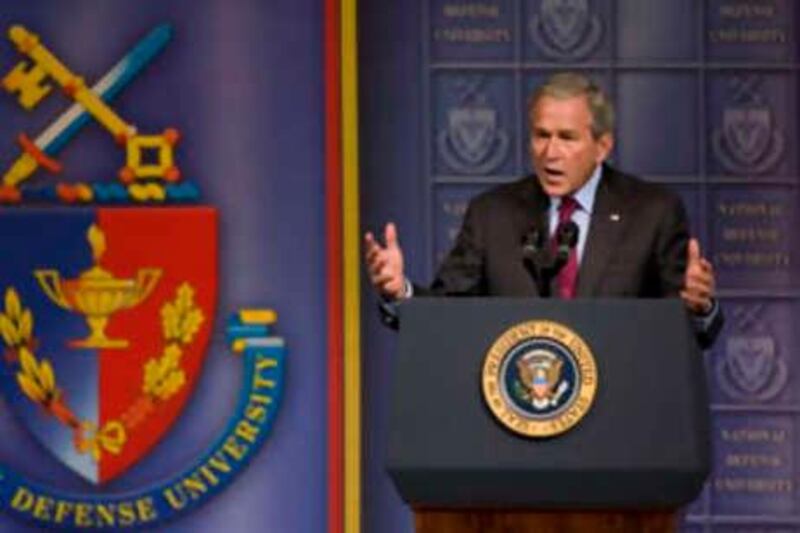WASHINGTON // Citing sustained security gains, George W Bush today announced a plan for modest reductions in US troop levels in Iraq by February, but said additional forces will be sent to Afghanistan as part of what he called a "quiet surge". In remarks at the National Defense University in Washington, the US president called progress in Iraq "fragile and reversible" but said that violence is at its lowest level since 2004 and that gains there finally enjoy a "degree of durability" that will allow for a gradual drawdown of troops. "While the enemy in Iraq is dangerous, we have seized the offensive, and Iraqi forces are becoming increasingly capable of leading and winning the fight," Mr Bush said, singling out progress in Anbar province, where civilian Iraqi authorities last week assumed responsibility for security. While forces that were part of the increase in military manpower known as the surge already have been withdrawn, another 8,000 combat and support troops will return home by February, Mr Bush said. He said further troop reductions could come in the first half of next year if the progress holds. But today's announcement effectively ensures that any dramatic decrease in troop levels in Iraq - which Democrats have long called for, and which has become a central issue in the presidential race - will not take place until after Mr Bush leaves office, if then. Even as the president spoke of improvements in Iraq, he said more needs to be done in Afghanistan. The security situation has deteriorated there, as the Taliban and al Qa'eda have regrouped. "Afghanistan's success is critical to the security of America and our partners in the free world," Mr Bush said. "And for all the good work we have done in that country, it is clear we must do even more. As we learned in Iraq, the best way to restore the confidence of the people is to restore basic security, and that requires more troops." A marine battalion that had been scheduled to deploy to Iraq in November will instead head to Afghanistan, he said, with an army combat brigade to follow in January. "The Taliban and al Qa'eda will not be allowed to return to power," Mr Bush said. "The terrorists will suffer the same fate in Afghanistan that they are now suffering in Iraq, and they will be defeated." The president's plan for removing troops in Iraq is based on a recent recommendation from Gen David Petraeus, the top US commander in Iraq, and the Joint Chiefs of Staff. And it represents a compromise of sorts between those who worry about jeopardising security gains by removing troops too quickly and those who see an urgent need to bolster the US and coalition presence in Afghanistan. Democrats immediately criticised the plan. The Senate majority leader, Harry Reid of Nevada, reportedly said he was "stunned" that the president would "bring so few troops home from Iraq and send so few resources to Afghanistan". Mr Bush highlighted in particular what he described as the success in Anbar province, which a 2006 military intelligence report had deemed "lost". He called the recent transfer of responsibility for security a "moment of pride for all Iraqis" and a "moment of success in the war on terror". "Two years ago, such a moment was unimaginable - to most," he said. Mr Bush's speech, which ran for around 30 minutes, was arguably as much about politics as it was military strategy. In the sunset of his eight years in office, it was an attempt to define his legacy on his own terms and to confront his critics head on. It likewise allowed him to take up a theme that has been central to his administration: the spread of democracy. Mr Bush said the war on terror is not just a military battle. "Defeating our enemies also requires success in the ideological battle," he said. "We must show the people of the broader Middle East a better alternative to a life of violence and despair, and that alternative is freedom." Toby Dodge, an Iraq analyst at the International Institute for Strategic Studies in London, said Mr Bush has actually been left with two competing legacies on Iraq: on one hand, he allowed the country, through what Mr Dodge called the mishandling of the war, to descend into civil conflict. On the other, Mr Dodge said, Mr Bush has claimed credit, through the surge, in halting it. "There clearly has been a drop in violence," Mr Dodge said. But, he added, "We've got a long way to go". Mr Dodge sees flaws in the policies of both presidential candidates in that they were designed on the campaign stump not with Iraqi realities in mind but with an eye to the American electorate, he said. John McCain was an early and vocal supporter of the surge who has not committed to a timetable for troop removal, while Barack Obama has promised a full withdrawal within 16 months; both have said they will send additional forces to Afghanistan. "The danger is that if Obama pulls troops out too quickly, he runs the distinct risk of catapulting Iraq back into civil war," he said. "McCain's policy is just more of the same, and the same has its problems." "The baseline is that Afghanistan is a huge mess," Mr Dodge said. "The policy has to change. Afghanistan obviously suffered from neglect because Iraq became the front line of the American debate." eniedowski@thenational.ae
Bush to withdraw 8,000 Iraq troops
George W Bush plans to reduce US troop levels in Iraq, but will send more forces to Afghanistan.

More from the national




